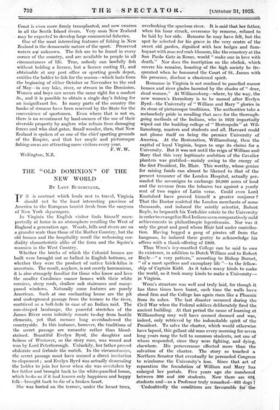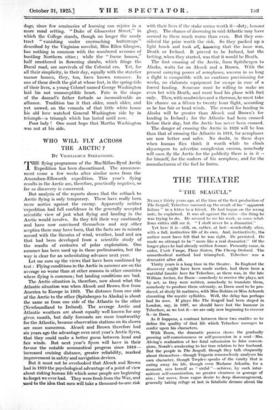THE "OLD DOMINION" OF THE NEW WORLD
BY LADY BURGHCLERE.
IFit is contrast which lends zest to travel, Virginia should not be the least interesting province of America to the European tourist fresh from the canyons Of New York skyscrapers.
In Virginia the English visitor finds himself unex- pectedly at home in an atmosphere recalling the West of England a generation ago. Woods, hills and rivers are on a grander scale than those of the Mother Country, but the old houses and the hospitality recall the welcoming cor- diality characteristic alike of the farm and the Squire's mansion in the West Country.
Whether the bricks of which the Colonial houses are built were brought out as ballast in English bottoms, or whether they were the product of native brick-kilns is uncertain. The result, anyhow, is not merely harmonious, it is also strangely familiar for those who know and love the smaller Carolinian manor houses with their white cornices, steep roofs, shallow oak staircases and many- paned windows. Naturally some features are purely American. Such at one enchanting house are the pit and underground passage from the terrace to the -river, contrived iA3 a bolt-hole in' case of an 'Indian raid. The sun-steeped landscape, the peaceful stretches of the James River seem infinitely remote to-day from hostile elements, yet that menace long overshadowed the countryside. In this instance, however, the traditions of the secret passage are romantic rather than blood- stained. Beautiful Evelyn Byrd, the daughter and heiress of Westover, so the story runs, was wooed and Won by Lord Peterborough: Unluckily, her father proved ()barite and forbade the match. 'In the eirdumstanees, the, secret passage must have. Seemed a direct invitation to elopement ; . and Evelyn Byrd was actually descending the ladder to join her lover when she was overtaken by her father and brought back to the white-panelled house, which looks as if it had known only happiness and happy folk—brought back to die of a broken heart.
She- was buried on the terraoe, under the locust trees, overlooking the spacious river. It is said that her father, when his hour struck, overcome by remorse, refused to be laid by her side. Remorse he may have felt, but the spot he selected for his grave in the very centre of the sweet old. garden, dignified with box hedges and flam-.
boyant with rose-red crab blossom, like the cemetery at the San Paolo Gate in. Rome, would ",make one in love with death." Nor does the inscription on the obelisk, which covers his remains, boasting of the high society he fre- quented when he honoured the Court of St. James with his presence, disclose a chastened spirit.
Romance in Virginia is not confined to panelled manor houses and river glades haunted by the shades of " dear, dead women." At Williamsburg—where, by the -way, the new women's Dormitory is to be named after Evelyn Byrd—the University of " William and Mary " glories in its store of picturesque traditions. The authorities take a melancholy pride in recalling that save for the thorough- going methods of the Indians, who in 1622 impartially wiped out the budding college of " Hericopolis " at Wil- liamsburg, masters and students and all, Harvard could not plume itself on being the premier University of America. At the Restoration, Williamsburg, then the capital of loyal Virginia, began to urge its claims for a University. But it was not until the reign of William and- Mary that this very legitimate ambition of the Cavalier planters was gratified—mainly owing to the energy of the first President, Dr. Blair. This worthy, whose genius for raising funds can almost be likened to that of the present treasurer of the London Hospital, actually per- suaded the sovereigns to exchange 20,000 acres of land and the revenue from the tobacco tax against a yearly rent of two copies of Latin verse. Could even Lord Knutsford have proved himself a greater 'conjuror ? That the Doctor mulcted the London merchants of some thousands, and induced the saintly scientist, Robert Boyle, to bequeath his Yorkshire estate to the University in order to evangelize Red Indians seem comparatively mild achievements in philanthropic legerdemain. Nor was it only the great and good whom Blair laid under contribu- tion. Having begged a gang of pirates off from the hangman, he induced these gentry to acknowledge his offices with a thank-offering of £800.
' Thus Wren's ivy-mantled College can be said to owe its existence, in addition to Dutch William and to Robert Boyle—" a very pattern," according to Bishop Burnet, " of a most spotless and exemplary life "—to the fellow- ship of Captain Kidd. As it takes many kinds to make the world, so it took many kinds to make a University— in Virginia.
Wren's structure was well and truly laid, for though it has three times been burnt, each time the walls have stood firm and the College has again risen like a Phoenix from its ashes. The last disaster occurred during the Civil War when the Federal soldiers deliberately fired the ancient building. At that period the cause of learning at Williamsburg may well have seemed doomed and was, indeed, only retrieved by the indomitable spirit of the President. To salve the charter, which would otherwise have lapsed, this gallant old man every morning for seven long years rang the bell to summon 'students, not one of whom responded, since they were fighting, and dying, elsewhere. His perseverance effected more than the salvation of the charter. The story so touched a Northern Senator that eventually he persuaded Congress to reimburse the University's loss. Since that act of reparation the foundation of William and Mary has enlarged her portals. Five years ago' she numbered between 300 and 400 students. Now there are 891 students and—as a Professor truly remarked-891 dogs !
-Undoubtedly the 'conditions are favourable for± the- dogs, since few seminaries of learning can rejoice in a more rural setting. " Duke of Gloucester Street," in which the College stands, though no longer the sandy tract " vanishing under encroaching buttercups " described by the Virginian novelist, Miss Ellen Glasgow, has nothing in common with the numbered avenues of bustling Northern cities ; while the " frame houses," ' half smothered in flowering shrubs, which fringe the Ducal road, are survivals of the Colonial era. Yet, for all their simplicity, in their day, equally with the statelier manor houses, they, too, have known romance. In one of these dwelt the girl at whose feet, in the spring-tide of their lives, a young Colonel named George Washington laid his not unsusceptible heart. Fate in the shape of the damsel's father forbade so inconsiderable an affiance. Tradition has it that older, much older, and yet unwed, on the veranda of that little white house his old love -watched General Washington ride by in triumph—a triumph which has lasted until now.
Poor lady ! One must hope that Martha Washington was not at his side.































































 Previous page
Previous page